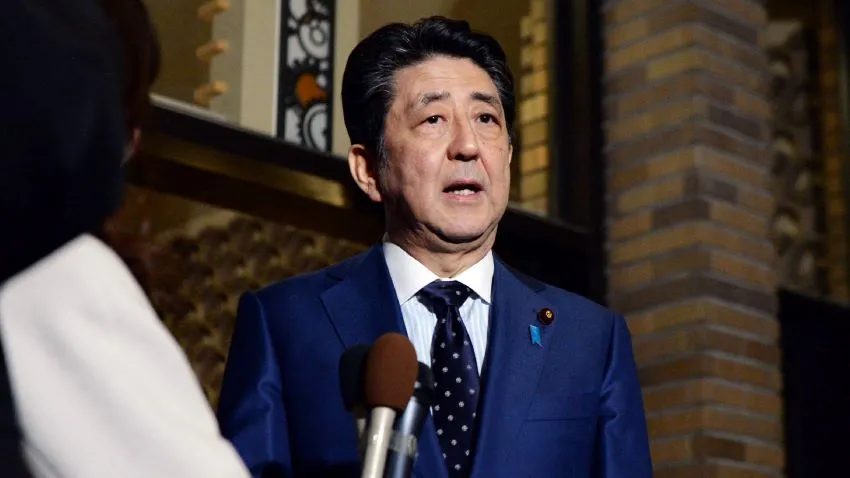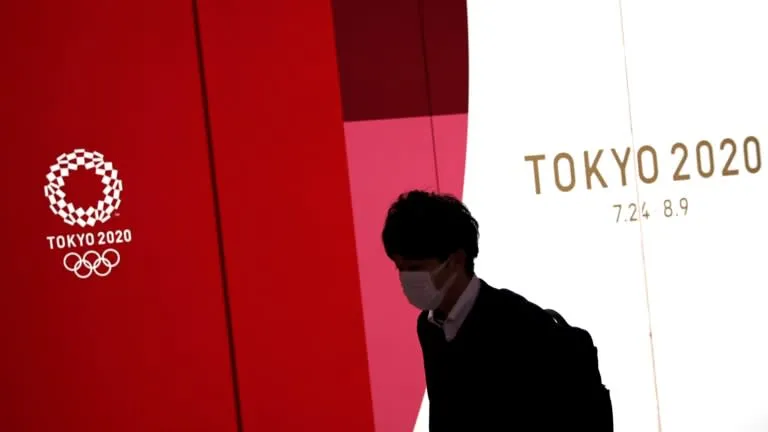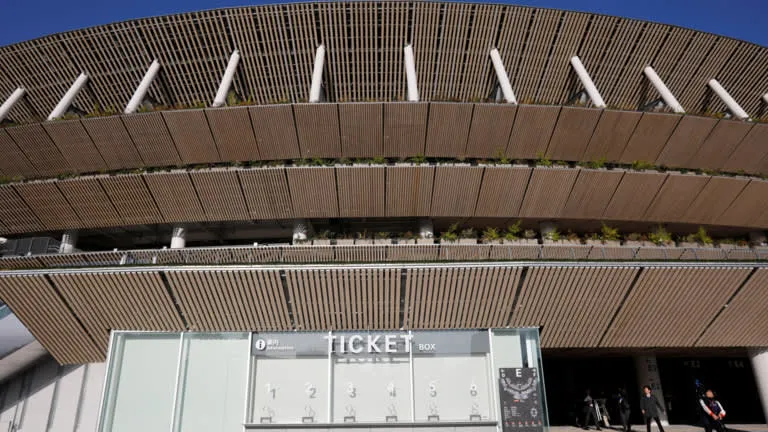
The Tokyo Olympic Games will be pushed back one year until the summer of 2021, Japanese Prime Minister Shinzo Abe told reporters Tuesday after speaking by phone with International Olympic Committee President Thomas Bach.
The much-anticipated decision comes after weeks of uncertainty for athletes, fans, sponsors and the Japanese public over an event that has cost the country $12.6 billion to stage.
"We agreed to host the games at the latest by next summer," Abe told reporters after the 45-minute call, which also was attended by Tokyo Gov. Yuriko Koike and Yoshiro Mori, president of the Tokyo Olympics organizing committee.
"I requested that the IOC consider delaying the games for about a year so that athletes throughout the world can attend under the best conditions and spectators feel safe," Abe said, adding that Bach "agreed 100%."
"We will work closely with the IOC to hold the Tokyo Olympics and Paralympics in their complete form to show future generations that humanity overcame the coronavirus," Abe said.
 A man wearing a protective face mask walks past the upcoming Tokyo 2020 Olympics decoration board in Tokyo on Monday. © Reuters
A man wearing a protective face mask walks past the upcoming Tokyo 2020 Olympics decoration board in Tokyo on Monday. © Reuters The coronavirus pandemic had raised questions about the safety of athletes and spectators convening in Tokyo this summer -- and whether they could even travel amid border closures and visa restrictions. Media polls showed that around 70% of Japanese did not expect the games to be held as scheduled.
The IOC and the Tokyo 2020 Organizing Committee said in a statement Tuesday that they agreed it is impossible to hold the games in July this year as scheduled or even by the end of the current calendar year. They also said that the Olympic flame will stay in Japan, and the games will "keep the name Olympic and Paralympic Games Tokyo 2020."
Speaking to reporters after his call with Abe, Bach expressed hope for holding the games next year.
"Sport is not the most important thing right now, preserving human life is," Bach said. "This Olympic flame will be the light at the end of this tunnel."
With the games postponed, the organizers face the daunting task of renegotiating multiple arrangements.
Contracts for Olympic venues will have to be extended, and the IOC will also have to iron out contractual obligations with its official broadcasters and sponsors. Newly built Olympic Village condominiums have already been sold for occupancy, and companies have lined up to bid on the privatization of Ariake Arena after the games, which were meant to end in early August.
Although Tokyo 2020 oversees ticketing for the games, a spokesperson for the organizing committee told Nikkei that it is leaving the matter to the IOC to decide whether to issue refunds. Olympic tickets currently come with a no-refund policy.
"We will discuss how to secure the rights of those who already have tickets," said Toshiro Muto, CEO of the Tokyo organizing committee. "There's no conclusion yet but we will give our full attention to them and respond appropriately in a way that will not cause any trouble to them."
The Japanese government, which has already dipped into its emergency funds to subsidize companies and individuals taking a financial hit from the coronavirus, will be pushed to support hotels and airlines that will be pressed for refunds by travelers.
 A ticket box is seen at the New National Stadium, the main stadium of Tokyo 2020 Olympics and Paralympics in Tokyo. Now the organizers have to decide how to compensate the non-refundable tickets. © Reuters
A ticket box is seen at the New National Stadium, the main stadium of Tokyo 2020 Olympics and Paralympics in Tokyo. Now the organizers have to decide how to compensate the non-refundable tickets. © Reuters Even before these unexpected costs, Japan already had significant economic exposure from the games.
An audit at the end of last year found that the Japanese government had spent over 1 trillion yen ($9 billion) on infrastructure projects related to the Olympics. Analysts expect the Japanese economy will lose $6 billion if the games do not proceed as planned, a major blow for an economy that many analysts see contracting this year.
The IOC's reluctance to make a call on a postponement has been broadly criticized. The New York Times called the delayed decision "out of step" with the current environment. In commentary Tuesday, the newspaper said, "The IOC's slog to a decision that so many saw as inevitable for weeks and its slow public responses to the coronavirus were the latest examples that the organization often seems out of step with much of the world."
Mori told reporters that Japan would cancel the start of the torch relay scheduled for March 26.
This would be the first time the games are delayed in over 100 years of modern Olympics history.
Pressure to delay the Olympics became insurmountable when the Olympic committees of Canada and Australia announced their withdrawal from the 2020 Games on Monday. The U.S. was among other nations that called for a postponement.
The outbreak of the coronavirus has rocked plans for an event that would have been a crowning moment for Abe, Japan's longest-serving prime minister.
Abe's government was criticized for its lack of urgency in its initial response as the virus began to spread from China -- most notably its handling of more than 670 people infected on the Diamond Princess cruise ship moored at Yokohama.
But then Abe surprised the public -- and members of his own cabinet -- by requesting the closure of schools nationwide at the end of February.
The prime minister denied the move was an attempt to stave off an Olympic cancellation, saying: "We need to prepare in advance against the infection risks posed by large numbers of children and teachers gathering together for long periods of time every day."
Last week, after an emergency teleconference to discuss the coronavirus, Abe said he won support from the leaders of the Group of Seven countries for Japan to hold the Olympics "in their full form." Nikkei later reported that global leaders including U.S. President Donald Trump gave Abe the thumbs up to postpone the games, rather than cancel.
The prime minister's choice of words, however, may have been a way to gauge public reaction to the message that a postponement was inevitable. Unlike previous statements regarding the Olympics in relation to the coronavirus, for the first time Abe last week made no mention of timing of the event.
International federations unable to hold pre-Olympic qualifying events and national committees raised their concerns to the IOC last week. Some athletes, including Canadian ice hockey player Hayley Wickenheiser, an IOC member, and Japanese judoka Kaori Yamaguchi, a member of the Japanese Olympic Committee, called for the Tokyo Games to be postponed.
After an emergency meeting on Sunday, the IOC executive board publicly acknowledged that it was discussing alternative scenarios for the games, despite increasingly urgent attempts by Abe government to show that Japan's homegrown outbreak could be contained.
But on Monday, the prime minister clearly said what he had been avoiding for weeks.
"If the IOC's decision means it becomes impossible to hold [the Olympics] in a 'complete form,' as I have previously said, then a decision may have to be made to postpone them," Abe told parliament.




















